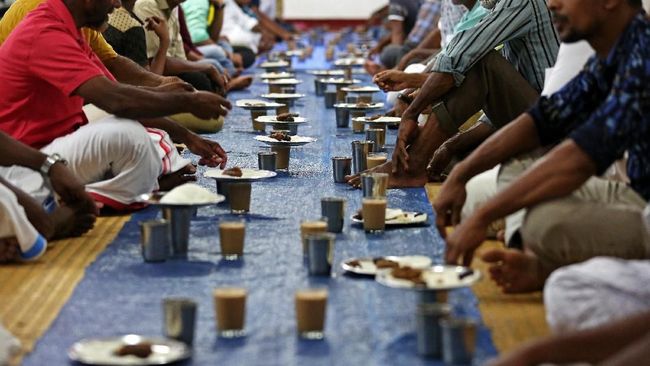Jakarta, CNBC Indonesia – Muslims start today fasting in Ramadan. The Dzahaba prayer for breaking the fast is one of the prayers that Muslims can practice to break the Ramadan fast.
Reciting the prayer for breaking the fast is recommended as a form of gratitude for the blessings that Allah SWT has given, as well as closing the fast with blessings.
Citing NU Online, the following is the recitation of the Dhahaba break-the-fast prayer which comes from the narration of Companion Abdullah bin Umar. This prayer is an authentic prayer that can be practiced by Muslims.
ADVERTISEMENT
SCROLL TO RESUME CONTENT
The thirst has gone, the veins have been moistened, and the reward has been confirmed, God willing.
Dzahabadzh dzhama-u wabtallatil-‘uruqu wa tsabatal-ajru insyaa-Allah
Meaning: “The thirst has disappeared and the veins have been wet and the reward is permanent, God willing.”
However, there are also the views of scholars who think that combining the two recitations of Allahumma laka shumtu and dhahaba for breaking the fast is as follows:
Oh God, I fasted for You, and because of Your provision I broke my fast, my thirst went away, my veins were moistened, and the reward was confirmed, God willing.
Allahumma laka sumtu wa ‘ala rizqika aftertartu, dhahaba alzzama’u wabtallatil ‘uruqu, wa thabata al-ajru in sha Allahi ta’ala.
Meaning: “O Allah, I fast for You, with Your sustenance I break the fast. The thirst has disappeared, the veins have been wet, and the reward remains firm, if Allah wills.”
That is the dzahaba prayer for breaking the fast, its meaning and the procedure for reading it. Hope it is useful.
This prayer is recited after Muslims break their fast by eating or drinking something. This is stated in the Book of Hasyiyah I’anah At-Thalibin by Sheikh Abu Bakar Muhammad Syatha from the Nahdlatul Ulama (NU) website as follows.
(And his saying: after breaking the fast) means after what breaks the fast, not before it, or during it
Meaning: The meaning of (reading the prayer for breaking the fast) after breaking the fast is the completion of breaking the fast, not (read) before and not during breaking the fast.
However, reading the iftar prayer before eating food and drink is actually not wrong.
It’s just considered sunnah, as explained in the following Book of Busyra Al-Karim by Sheikh Said bin Muhammad Ba’ali.
It is Sunnah to say in his presence, that is, at his will, and it is preferable after him: Oh God, I have fasted for you and for your provision I have broken my fast.
Meaning: It is Sunnah for people when they want to break their fast, but the most important thing after breaking their fast is to recite the prayer ‘Allahumma laka shumtu wa ‘ala rizqika aftharthu’.
Therefore, so that the Sunnah is more perfect, it is best to read the prayer for breaking the fast after breaking the fast.
As for the reading, there are several versions of the prayer for breaking the fast. Among the most popular are the words Allahumma laka shumtu and dzahaba dzomau.
The Prophet himself taught this prayer to his friends as part of the proper procedure for breaking the fast.
[Gambas:Video CNBC]
Next Article
100 Congratulations on Performing the Fasting Worship of Ramadan 2024
(ayh/ayh)
